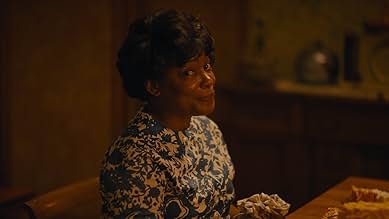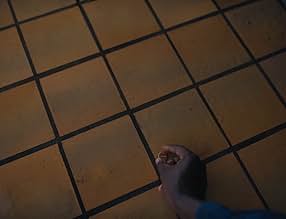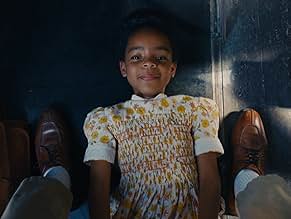A powerful friendship develops between two young Black men as they navigate the harrowing trials of reform school together.A powerful friendship develops between two young Black men as they navigate the harrowing trials of reform school together.A powerful friendship develops between two young Black men as they navigate the harrowing trials of reform school together.
- Director
- Writers
- Stars
- Nominated for 2 Oscars
- 60 wins & 179 nominations total
- White Boy
- (as Zachary Luke Van Zandt)
- Director
- Writers
- All cast & crew
- Production, box office & more at IMDbPro
Summary
Featured reviews
A Muddled Mess: "The Nickel Boys" Suffocates Under Visual Chaos
The film follows Elwood Curtis, a bright and idealistic young black man wrongly sentenced to the Nickel Academy, a supposed institution of learning that is, in reality, a breeding ground for sadism and racial violence. We witness the horrors through Elwood's eyes, alongside his more cynical companion, Turner. However, witnessing these horrors is a frustratingly difficult task, thanks to Ross's baffling stylistic choices.
Instead of establishing a sense of place and allowing the audience to breathe in the suffocating atmosphere of Nickel, the film throws us into a relentless barrage of close-ups. Faces fill the frame, disembodied and divorced from their surroundings, leaving us with no context for their expressions or the environment that informs them. This constant proximity might have been effective in creating intimacy if it wasn't paired with a dizzying array of first-person perspectives.
We're thrust into the shoes of various characters, often with no clear indication of who we're supposed to be inhabiting. The camera becomes an erratic, disorienting stand-in for the eyes of the boys, sometimes even inexplicably positioned to stare at the back of Elwood's head. This technique, presumably intended to immerse us in the characters' subjective experiences, achieves the opposite effect. It detaches us, leaving us scrambling to understand basic spatial relationships and the narrative flow.
The result is a chaotic, disorienting mess. Scenes that should be emotionally impactful are reduced to a jumble of fragmented images. Key moments of violence are obscured by the shaky, often illegible camerawork. The film's attempts at conveying the psychological toll of trauma are lost in the visual clutter. It's as if the filmmakers were so determined to avoid a conventional approach that they forgot the fundamental purpose of cinematography: to tell a story visually.
While the performances from the young cast are commendable, particularly Ethan Herisse as Elwood, their efforts are ultimately undermined by the film's impenetrable style. "The Nickel Boys" had the potential to be a powerful and necessary piece of cinema, but it is ultimately undone by its own cinematic excesses. Instead of illuminating Whitehead's devastating story, the film buries it under a mountain of ill-conceived visual choices, leaving the audience lost in the dark, struggling to see the tragedy unfolding before them. It's a film that tragically fails to understand that sometimes, less truly is more.
One of the oddest films that I have ever seen.
What a train wreck. Seriously. I think this director has a great future, but he threw everything into this film but the kitchen sink. I hated the hand held shaky cam stuff. Why did he do that? It tended to be more shaky early in the film so it kind of set me off early and the story and acting had to win me back. The way POV was utilized throughout was very distracting. We are seeing everything unfold through the character on the screens eyes. At times it is really confusing. The camera is the character. No normal film type interactions at all. Sure if works from time to time, but overall it is annoying. The set up to when Elwood gets in trouble is very long and not well constructed. I have not read the novel but I would guess it has a section about the (limited?) legal process that occurs. It would have been a nice touch. Loved some of the odd montages. Hated others. I still gave it a 7., for the gripping story this film tells, but man ,what a weird film.
Don't take any wooden nickels, boys
If you go into this film without knowing what it's about, you'd never know it's based on a true story. There are scenes, particularly in the beginning, that don't really add up to much ultimately. For a film about such bleak subject matter, the film feels very dreamlike, fantastical, and over-stylized. Because of this, the film almost feels like a projection or rosy retrospection of the abusuve reform school, in lieu of a realistic portrayal of what that must have been like for the victims. Off of that point, it felt like the director was unsure what he wanted the film to be about: the horrors of the reform school or the power of friendship between the two central boys. Much of the abuse is implied or heard off-screen, so how trying and scary the environment must have been for the boys is never really fleshed out, it's mostly implicit. And while the friendship between the boys is shown, how they went from being bunkmates to being best friends isn't necessarily limned or shown for viewers. The story is quite jumpy, at times includes arbitrary scenes, and thus the plot can feel confusing.
How nice the film looked took away from how impactful it could've actually been. The cinematography is certainly beautiful to look at, but the use of the first-person shots were unnecessary and don't really add much to the story. There are many scenes of characters talking to one another and because the film is in first-person POV, you have the actors talking straight into the camera; it more often than not feels awkward, stilted, and contrived, almost reminiscent of a video game or hologram. It just felt bizarre much of the time.
This easily could've been told in a traditional, third-person way and the film would've been much better than it is. The first-person gimmick also sullies the experience of understanding just how bad things are for the characters because we literally only see two perspectives, not an objective view or the totality of the mistreatment. And the pacing much of the time is unfortunately mediocre. A good half hour could've been trimmed from this film.
The performances are good though, and really carry the film. Aujanue Ellis-Taylor gives a great performance, portraying a grandmother trying to come to grips with a deeply unsettling situation she finds her grandson in. The acting of the two leads is also quite good.
Overall, it's beautiful to look at with some strong acting, and I appreciate the big swing that was taken here by the director, but the story could've been told and edited better than it was.
Being abstract is one thing, and being confusing is another.
I'm now going to list all those 'fresh' approaches of the director. However, I cannot find the 'purpose' of these approaches. Why does he choose these specific tools and forms to create what effect on the audience? None of them are answered. First, screen ratio. The director chooses a 1.33:1 ratio. It rather feels stuffed, blocking a wider view. My sight is blocked the whole time. Second, lots of montage, jagged editing, and lots of quick cuts. Again, I don't know why the director chooses this way, and I'm sure his intention has failed because It feels chopped and segmented, hindering the continuity and the flow of the movie and making the ending more confusing. In addition to these editing problems, story development is slow, making things worse.
Powerful Story. Annoyingly Done.
The film is shot in a POV style where the camera is meant to represent the character's perspective, which ends up being wildly distracting. Not only does this approach pull you out of the action, but there are moments where you're left wondering what the hell you're even looking at. For example, there are several shots of the back of someone's head. Who is seeing that? Are we supposed to believe the character can see the back of their own skull?
I shouldn't have to ask questions like that. And I wouldn't, if the film had drawn me in. But the overly gimmicky style makes that impossible. This could have been a very powerful movie-the subject matter certainly deserves it. However, the overly clever filmmaking drains it of any real impact.
The acting and writing just barely manage to save it from being a complete disaster, but you still leave the theater wanting so much more.
5 Film Recs From Director RaMell Ross
5 Film Recs From Director RaMell Ross
Did you know
- TriviaIn an interview with Vanity Fair, director RaMell Ross states ""The film is conceived as all one-ers. In one scene, we shot everything from Elwood's perspective, and then everything from Turner's--one from the first hour, and then the other for the second. Very rarely did we shoot both perspectives on a scene, though, because of the way it was written and scripted. We don't always go back and forth. So it's shot like a traditional film, except the other character is not there. They're just asked to look at a specific point in the camera. Typically, the other actor is behind the camera, reading the lines and being the support to make the other person feel like they're actually engaged with something relatively real. Because they're all one-ers, though, the choreography is quite difficult."
- GoofsEarly in the movie, when MLK is shown on various TV screens in the window of a store, you can see the camera's reflection in the bottom left of the screen.
- Quotes
Turner: This can be a three-day job we play it right. We till the garden and fix up her house, she may even adopt our black asses. Well not you, you got family. I'd yessum her for a chance out of Nickel.
Elwood: That ain't no freedom. I mean you know Director Hardee and his wife ain't supposed to use us like we're slaves.
Turner: Man, all those guys on the school board have us do chores. Sometimes it's favors, sometimes it's for real money.
Elwood: But it's against the law.
Turner: [Turner laughs] Man, the law's one thing. You can march and wave signs around and change a law if you convince enough white people. I saw those college kids in Tampa with their nice shirts and ties sitting at the Woolworth's. I had to work, but they were out protesting. And it happened, they opened that counter. But I didn't have the money to eat there either way. Gotta change the economics of all this, too.
Elwood: My grandma got me that lawyer, man. Make a move there, first.
Turner: The courts play both the white and the black. They just move us around when they're ready.
Elwood: And we have to be like knights. Checkmate.
Turner: How many people you know done that, El? There's four ways out of Nickel. Serve your time -or age out-. Court might intervene -if you believe in miracles-. You could die -they could kill you-. You could run. Only four ways out of Nickel.
- ConnectionsFeatured in WatchMojo: Top 10 Best Movies of 2024 (2024)
- SoundtracksYoung Girl
Written, Composed, and Produced by Herschel Dwellingham
Performed by Frank Lynch
Courtesy of Grass of Home Productions and Publishing (BMI)
- How long is Nickel Boys?Powered by Alexa
Details
Box office
- Budget
- $20,000,000 (estimated)
- Gross US & Canada
- $2,858,346
- Opening weekend US & Canada
- $54,794
- Dec 15, 2024
- Gross worldwide
- $3,016,380
- Runtime
- 2h 20m(140 min)
- Color
- Aspect ratio
- 1.33 : 1








































